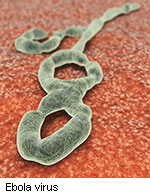
FRIDAY, Oct. 3, 2014 (HealthDay News) — About 50 people in Texas are now being checked daily for possible Ebola infection, based on their prior contact with the Liberian national undergoing treatment in Dallas for the deadly virus, health officials said Friday.
None of the 50 currently has a fever or any other symptoms of Ebola, and most have a low risk of infection, Dr. David Lakey, commissioner of the Texas Department of State Health Services, said at a midday news briefing.
About 10 of the 50 people are considered at elevated risk for Ebola based on their contact with the Liberian national, Thomas Eric Duncan, who is being treated at Texas Health Presbyterian Hospital, Lakey said.
All of the people being monitored will receive twice-daily temperature checks, said Dr. Beth Bell, director of the U.S. Centers for Disease Control and Prevention’s National Center for Emerging and Zoonotic Infectious Diseases.
“There certainly is a possibility that some of the people who have been in very close contact with this patient might develop Ebola, and that’s why this close monitoring is so important,” Bell said.
The number of people under scrutiny has been pared down from an initial group of about 100, based on interviews that determined the amount of contact each person likely had with Duncan after he began showing symptoms of Ebola, Bell said.
Duncan is the first person diagnosed in the United States with Ebola, the often-lethal disease that has been sweeping through several West African nations since the spring.
The higher-risk people now being monitored include some health care workers who have been furloughed with pay, said Dallas County Judge Clay Lewis Jenkins. None of the people considered at high risk are allowed to travel outside Dallas, and are receiving a daily visit from public health workers.
The low-risk individuals have no restrictions on travel, and are self-administering their temperature checks, Jenkins said. They speak with public health officials once a day by phone.
“If individuals are not adhering to these guidelines, we have law enforcement go check on these individuals to make sure they’re OK, if needed,” he said.
Four relatives of Duncan’s remain quarantined in the Dallas apartment where he first showed signs of infection, Jenkins said. Officials went to the home Friday to remove sheets, clothes and towels that Duncan had used, which could be tainted with the virus.
Cleaners had been set to go into the home on Thursday to sanitize and remove the potential biohazard material, but could not because the U.S. Department of Transportation requires a specialized permit to haul away materials exposed to Ebola. The DOT considers Ebola a life-threatening “category A” infectious agent that can’t be handled like normal medical waste.
“Even as we speak now, we don’t have the permits in place to dispose of the soiled items,” Jenkins said, adding, “I don’t need a DOT permit to move material inside Dallas County to a secure location while we await those permits.”
Jenkins said officials are considering moving Duncan’s relatives to better housing with an in-home washer and dryer.
The family members — Duncan’s partner, Louise Troh, her son and two nephews in their 20s — have been ordered to stay in the apartment until Oct. 19, according to published reports.
Besides Duncan’s family members, people under observation include five schoolchildren as well as the three-member ambulance crew that transported Duncan on Sept. 28 to Texas Health Presbyterian Hospital in Dallas.
Duncan may have had contact with the five children at a home in Texas last weekend. The children attend four different schools, including a high school, a middle school and two elementary schools, The New York Times reported.
Duncan flew to the United States from Liberia last month after quitting his job with a shipping company in Monrovia, Liberia, one of the West African nations battling the Ebola outbreak. He first developed Ebola symptoms Sept. 24 and sought care two days later at Texas Health Presbyterian Hospital, but was released from the hospital. Some hospital officials said they weren’t aware at the time that he had been in West Africa.
Duncan was taken back to Texas Health Presbyterian Hospital on Sept. 28 after his condition worsened.
Before he left Liberia, Duncan was screened for Ebola at an airport and his temperature was normal. He only came down with symptoms about four or five days after arriving in the United States, according to the CDC.
All passengers leaving West Africa are being screened for fever, a typical Ebola symptom, CDC Director Dr. Tom Frieden has said. To date, approximately 12 people have been prevented from boarding planes, but none has come down with Ebola. Instead, they have had other illnesses, such as malaria, he said.
In related news, an American freelance cameraman just hired to work for NBC News in Liberia tested positive for Ebola and is being flown back to the United States for treatment.
The network said in a statement that the 33-year-old man was hired Tuesday as a second cameraman for chief medical editor and correspondent Dr. Nancy Snyderman. Snyderman and three other NBC News employees have been reporting on the Ebola outbreak in Liberia. The entire news crew would be flown back to the United States on a private jet and quarantined for 21 days as a precaution. So far, no one other than the cameraman shows symptoms of infection, the network said.
Frieden stressed that Ebola is not easily transmitted — to become infected a person must come into direct contact with the bodily fluids of a person who is suffering symptoms. Those symptoms include fever, muscle pain, vomiting and bleeding and can appear as long as 21 days after exposure to the virus.
The Duncan case in Dallas is the sixth to be treated in the United States since the Ebola outbreak began in West Africa last spring. An unidentified American doctor who had been working in Sierra Leone is currently being cared for at a hospital at the U.S. National Institutes of Health in Washington, D.C.
Three others who became infected with the virus have recovered, while a fourth continues to undergo treatment at Emory University Hospital in Atlanta.
The Ebola epidemic in West Africa is the worst outbreak ever of the disease. So far, an estimated 6,500 people have become infected and nearly 3,100 have died in the countries of Guinea, Liberia, Nigeria and Sierra Leone, according to the World Health Organization.
U.S. health officials have warned that the epidemic could strike as many as 1.4 million people by mid-January unless the global community mounts a rapid response to the crisis.
More information
For more on Ebola, visit the U.S. Centers for Disease Control and Prevention.
Copyright © 2025 HealthDay. All rights reserved.

